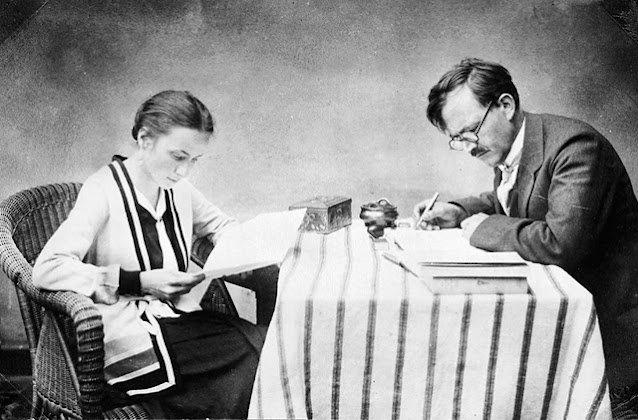 |
| The "great theologian" unleashed his great epigrams on the hapless world. His blabbering nonsense now sells for pennies on the dollar. |
 |
| Says the "great theologian" who took his lovely assistant on his tour of America. They saved on their hosts' linen by sharing the same bed. Eine kleine Nachtmusik, Ja? |
Complete Luther Sermon Here->Reminiscere. Second Sunday in Lent. Exhortation to Holiness. 1 Thessalonians 4:1-7.
8. The nature of the holiness and purity whereof he speaks he makes plain himself in the words: “That ye abstain from fornication; that each one of you know how to possess himself of his own vessel in sanctification and honor.” The apostle does not here prohibit matrimony, but licentiousness, and unchastity outside the marriage state. He who is careful to keep his vessel — his body — chaste, who does not commit adultery and is not guilty of whoredom — this man preserves his body in holiness and purity, and properly is called chaste and holy. The same thought is borne out in the succeeding verse: “Not in the passion of lust [in the lust of concupiscence], even as the Gentiles.”
9. The Gentiles, who know not God, give themselves up to all manner of uncleanness, or disgraceful vices, as Paul records in Romans 1:29-31.
Not that all gentiles are guilty in that respect. Paul is not saying what all heathen do; he merely states that with the gentiles such conduct is apparent, and quite to be expected from people “who know not God.”
Under such conditions, one allows the sin to pass unreproved, as does Paul himself. Notwithstanding he censures them who consent to sin of this character when knowing better, and who do not restrain the evil-doers.
Romans 1:32. But in the case of Christians, when any fall into such sin they are to be reproved and the sin resisted; the offense must not be allowed to pass as with the gentiles. In the case of the latter the lust of concupiscence holds sway; no restraints are exercised and the reins are given to lust, so that its nature and passion are given free expression, just as if this were a provision of nature, when the fact is it is a pest to be healed, a blemish to be removed. But there is none to heal and deliver, so the gentiles decay and go to ruin through evil lust. “Lust of concupiscence” would be, with us, “evil lust.” The conclusion is simple: “That no man transgress and wrong his brother in the matter.”
10. In other words, that no one take for himself what belongs to another, or use the property of another for his own benefit, which may be done by a variety of tricks. To “defraud in any matter” is to seek gain at the expense of a neighbor. On this latter subject much has been written elsewhere, particularly in the little treatise on Merchants and Usury, showing the great extent to which extortion is practiced and how charity is rarely observed. It is on this topic that Paul here would fix our attention.

Karl and his research assistant worked very closely together. He wrote the large print headings in their Dogmatics. She wrote the fine print, the research which was too much for him.
 |
| Charlotte seems to be saying, "Turn off das Camera!" |




